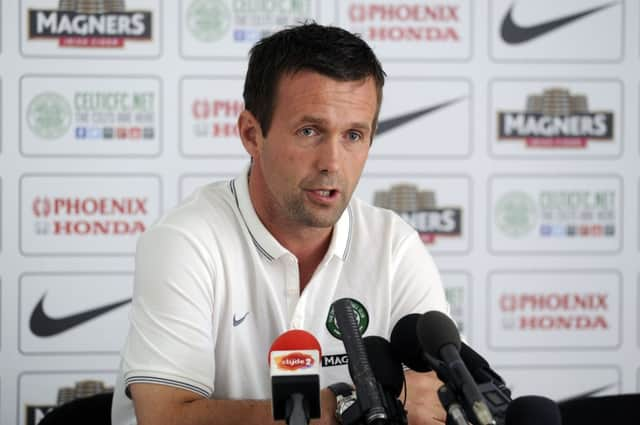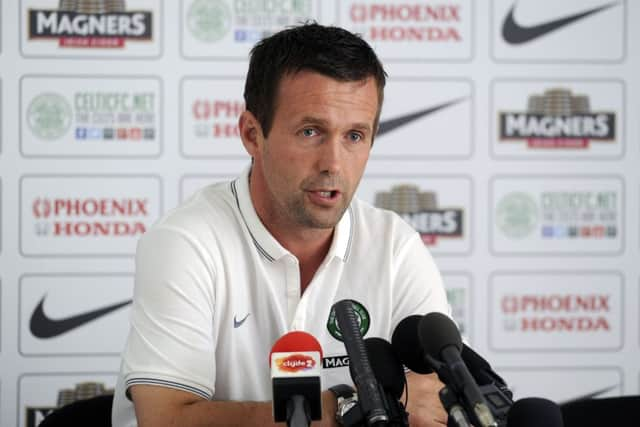Pitch in to find Scottish Messi, urges Ronny Deila


It is his answer to fears that the gulf between Scottish and English football has grown to an irrecoverable degree following the new £5.1 billion television dealsigned this week between the Barclays Premier League and a combination of Sky Sports and BT Sport. Deila accepts this illustrates how English football, at the top end at least, is now “unbelievably different” to Scottish football, and football most places elsewhere for that matter.
But he believes those in Scotland should stop obsessing about the boom time in England and start concentrating on things they can do something about, such as improving facilities in the game.
Advertisement
Hide AdAdvertisement
Hide AdHe wants Scottish football to become a football factory again, in response to the blue-chip business operating next door. He is doing his bit, he stressed, by ensuring he wields influence at all age levels at Celtic. Deila pointed out that all three substitutes used by Celtic in midweek were players developed as youngsters by the Parkhead club.


FOLLOW US
SCOTSMAN TABLET AND MOBILE APPS
Of course, this boast might stick in the craw of Dundee United fans, who likely watched with dismay as two players their club helped introduce to the Scottish game – or in the case of Mackay-Steven, rehabilitated – made an instant impact for Celtic on Wednesday after moving from Tannadice. But this, Deila suggested, is simply the natural order of things.
He accepts that just as United struggled to stave off the advances of Celtic, so Celtic will be powerless should an English club decide they wish to sign Armstrong.
Indeed, Deila admitted that without goalkeeper Fraser Forster’s £10m sale to Southampton, Celtic might have been unable to do business with United. Deila welcomed the prospect that Armstrong, among others, could soon be a target for English clubs. “Hopefully in two years, when he goes to England, he [Armstrong] will say the biggest and most important decision he made in his life was coming to Celtic,” said Deila. “Then the next one might look at it and think, ‘if he can do it so can I’.”
The new TV deal in England doesn’t change anything for Scottish football, Deila explained. “We would not cope with or afford the salaries beforehand anyway,” he said.
Times have moved on from 15 years ago, when the likes of Chris Sutton could be attracted north from Chelsea and the disparity between Scottish and English football’s respective television deals was not quite so stark. Now Deila admits Celtic are not even in the queue for Chelsea cast-offs.
“That time has gone, when you knew you could get big players in England coming to Celtic,” he said. “So we have to be very good at what does not cost so much money and that is creating a culture of development and performances. You have to build up Scottish talent like Armstrong and Mackay-Steven, and Liam Henderson.”
His interest in developing young players was one reason why Deila was chosen to replace Neil Lennon in the summer. He had shown what he could do at Norwegian club Stromsgodset, who recently sold 16-year-old star Martin Odegaard to Real Madrid for just over £2m. Deila described Odegaard as a “once in every ten years player”. However, he added that even someone as good as Messi could come from Scotland – “if you believe it”.
Advertisement
Hide AdAdvertisement
Hide AdAlthough clearly blessed with innate talent, the Argentine was given every chance to make it by Barcelona’s careful development strategy. This probably involved making sure he did not have to hack away a layer of ice on frozen pitches before he could start to play the game he loved.
“How can youngsters play football on a pitch every day that’s not good?” asked Deila. “We have to stop thinking everything is about the results. You have to start thinking about development. That is the only way a small nation has a chance, the same as Norway. In Norway they have 15 or 20 big indoor halls, maybe 30 smaller ones. That is what brings up good talents because they are working in an environment where they are allowed to grow. They don’t think about results when they play.”
So Deila’s philosophy is this: don’t think about the money going into English football, think instead about developing players who can bring money into the game by being sold off elsewhere.
It sounds a lot like common sense. It’s certainly the antidote to the financial madness which, while making the rich richer, serves to stifle the grassroots game in England.
SEE ALSO